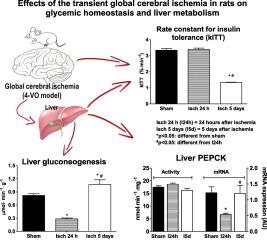Biochimica et Biophysica Acta (BBA) - Molecular Basis of Disease ( IF 6.2 ) Pub Date : 2020-08-19 , DOI: 10.1016/j.bbadis.2020.165934 Anacharis B Sá-Nakanishi 1 , Monique Cristine de Oliveira 1 , Vanesa O Pateis 1 , Luciana A P Silva 1 , Heloísa V Pereira-Maróstica 1 , Geferson A Gonçalves 1 , Marco A S Oliveira 1 , Jacqueline Godinho 2 , Lívia Bracht 1 , Humberto Milani 2 , Adelar Bracht 1 , Jurandir F Comar 1

|
Cerebral ischemia-induced hyperglycemia has been reported to accentuate neurological damage following focal or global cerebral ischemia. Hyperglycemia found in rats following focal brain ischemia occurs in the first 24 h and has been claimed to be caused by increased liver gluconeogenesis and insulin resistance. However, liver gluconeogenesis and the mechanisms leading to hyperglycemia after global cerebral ischemia remain uncertain. This study investigated the glycemic homeostasis and hepatic metabolism in rats after transient four-vessel occlusion (4-VO)-induced global cerebral ischemia, an event that mimics to a certain degree the situation during cardiac arrest. Several metabolic fluxes were measured in perfused livers. Activities and mRNA expressions of hepatic glycolysis and glyconeogenesis rate-limiting enzymes were assessed as well as respiratory activity of hepatic isolated mitochondria. Global cerebral ischemia was associated with hyperglycemia and hyperinsulinemia 24 h after ischemia. Insulin resistance developed later and was prominent after the 5th day. Hepatic anabolism and catabolism were both modified in a complex and time-dependent way. Gluconeogenesis, β-oxidation, ketogenesis and glycolysis were diminished at 24 h after ischemia. At 5 days after ischemia glycolysis had normalized, but gluconeogenesis, ketogenesis and β-oxidation were accelerated. The overall metabolic modifications suggest that a condition of depressed metabolism was established in response to the new conditions generated by the cerebral global ischemia. Whether the modifications in the liver metabolism found in rats after the ischemic insult can be translated to individuals following global brain ischemia remains uncertain, but the results of this study are hoped to encourage further investigations.
中文翻译:

患有整体性脑缺血的大鼠的血糖动态平衡和肝代谢发生改变。
据报道,脑缺血引起的高血糖症会加剧局灶性或整体性脑缺血后的神经系统损害。在局灶性脑缺血后的大鼠中发现的高血糖发生在头24小时内,据称是由肝糖异生增加和胰岛素抵抗引起的。然而,整体脑缺血后肝糖异生和导致高血糖的机制仍不确定。这项研究调查了短暂性四血管阻塞(4-VO)诱发的整体性脑缺血后大鼠的血糖稳态和肝代谢,该事件在一定程度上模拟了心脏骤停时的情况。在灌注肝脏中测量了几种代谢通量。评估肝糖酵解和糖原异生速率限制酶的活性和mRNA表达,以及分离的肝线粒体的呼吸活性。缺血24小时后,全脑缺血与高血糖和高胰岛素血症有关。胰岛素抵抗发展较晚,并在第5天后显着。肝合成代谢和分解代谢都以复杂且依赖时间的方式进行了修饰。缺血24小时后,糖原生成,β-氧化,生酮和糖酵解减少。缺血后第5天,糖酵解已恢复正常,但糖原异生,生酮和β-氧化得到加速。总体代谢改变表明,响应于由脑整体缺血产生的新状况,建立了代谢减缓的状况。



























 京公网安备 11010802027423号
京公网安备 11010802027423号